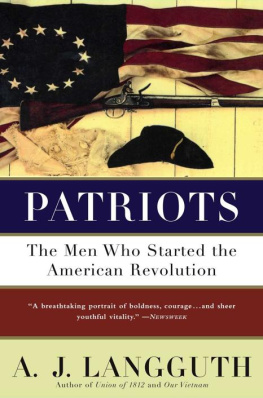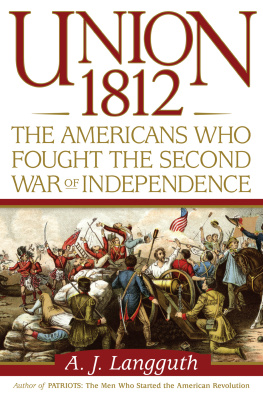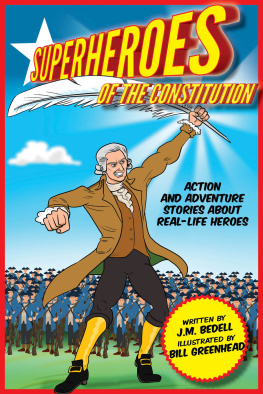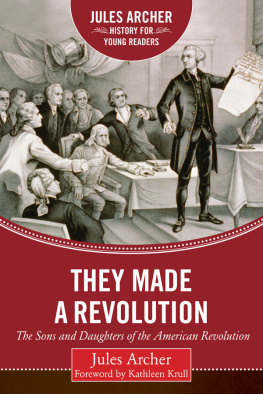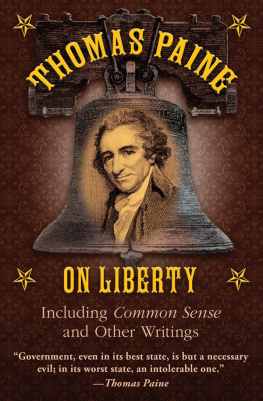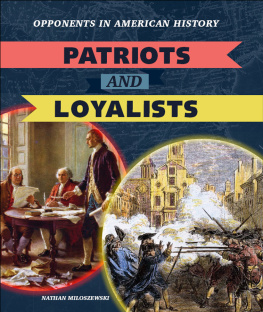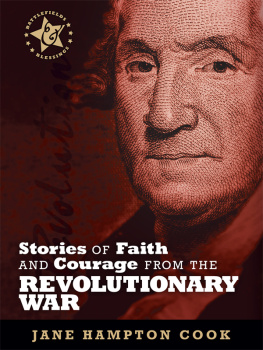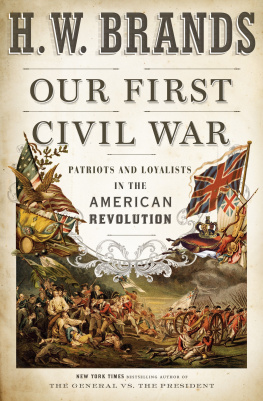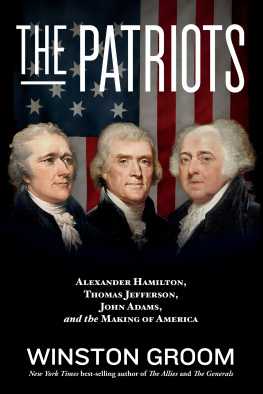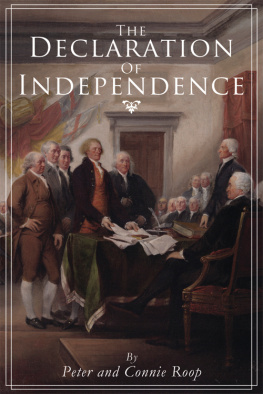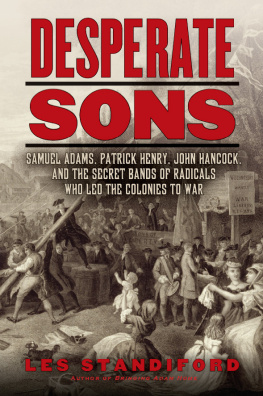Thank you for downloading this Simon & Schuster eBook.
Join our mailing list and get updates on new releases, deals, bonus content and other great books from Simon & Schuster.
C LICK H ERE T O S IGN U P
or visit us online to sign up at
eBookNews.SimonandSchuster.com
Contents
F OR
D ORIS L ANGGUTH
(1906-1988)
Otis
176162
J OHN A DAMS , a twenty-five-year-old lawyer from the country, looked around Bostons Town House and was dazzled by its splendor. Adams had never been to London, but he was sure that nothing in the House of Commons could be more imposing than the sight of five judges in scarlet robes and luminous white wigs, seated in front of a marble fireplace. On the wall were portraits of two former British kings, Charles II and James II, which had been sent from London years before. They had been stored in an attic until a recently installed governor of Massachusetts, Francis Bernard, had discovered them and had them cleaned and mounted in magnificent gold frames. Adams was aware that both kings were autocrats and he suspected that giving them such a place of honor showed Bernards political bias. But he thought them beautiful, worthy of Rubens or Vandyke.
Adams had come on this overcast morning in February 1761 to see the climax to a political drama that had been unfolding for months. Normally, the days proceedings would have been routine: a new king had recently taken the throne in England, and a document called the writ of assistance had to be approved once again by the colonys Superior Court. But the writ was in fact a general search warrant, and it represented a serious economic threat around Boston Harbor. When ships sailed past the islands in the channel and came to anchor at one of Bostons long wooden wharves, they were often smuggling illegal goods along with their legitimate cargo. Molasses was especially popular, since it could be shipped legally only from British ports. Some sixty distillers around Massachusetts turned the molasses into millions of gallons of rum each year, and the traders who supplied them bought a better quality at French and Dutch ports in the West Indies and avoided the British taxes. Over the past twenty years, Bostonians had suffered economic depressions, and they were worried now that Londons attempt to enforce the customs law might set off more hard times. That would affect not only the merchants but also the men who built the ships and sailed them, the distillers and shopkeepers, the artisans who supplied silver buckles and candlesticks, even the towns hundreds of teenage apprentices in their leather aprons.
The persistent war between England and the French and their Indian allies had provided an economic boom for a few profiteers, but the peace that now seemed assured might bring inflation and greater debt. Bostons wealthiest merchants enjoyed a cushion against a depression; five hundred of the sixteen thousand residents owned nearly fifty percent of the towns assets. But one out of three adult men had no property or even a regular job, and they hung about the wharves taking whatever work they found or signing on as sailors. Some were forced to leave the capital altogether for one of the smaller communitiesSalem, Gloucester, Marblehead.
British law already gave the crowns tax collectors permission to search a ship while it lay at anchor in the bay, although few had ever been zealous about making the effort. Some of those appointed were Londoners who never bothered to come to America. Others could be bribed. Britain spent eight thousand pounds each year on salaries for the customs service and collected two thousand pounds in taxes. But the writs that were to be reauthorized were more menacing because they allowed officials to break into a mans warehouse or even his home to find contraband. Disruptions during the war with the French had prevented the writs from being widely used, but now, with Britain moving to enforce the law, merchants in Boston and Salem had responded by challenging the writs legality and had hired two prominent lawyers to argue the case before the Massachusetts Bay Colonys highest court.
This public aspect of the dispute was what had drawn Adams to the Town House. But, like most observers, he knew there were also personal resentments that could affect the cases outcome. At the center was Thomas Hutchinson. Despite his lack of training as a lawyer, Hutchinson had been appointed by Governor Bernard three months earlier to replace the chief justice who had died. For thirty years, Massachusetts lawyers had been struggling to win respectability for their calling, and many were disgusted that their professions highest honor had gone to a man who was reading elementary law texts at night to prepare for court. John Adams was a self-conscious young man, desperately ambitious, and he had come to the capital from the town of Braintree to make his reputation. He thought he understood why Hutchinson had been named to the high court. The previous chief justice had expressed doubts that the writs were legal. Hutchinson was known to support them. But the significance of his appointment went far beyond that.
John Adams came from an honest and hard-working but not particularly distinguished family, and he was contemptuous of the idea that a mans place in society should be determined by his lineage. And in Boston, few men represented entrenched privilege more clearly than Thomas Hutchinson. The Hutchinsons had been successful businessmen for generations, and Thomas had been brought up to be a member of Bostons ruling class, although he had to contend with problems within the family. His father suffered from nervous disorders that kept him shut up in his house for weeks and from chronic insomnia, and he had lost two favorite sons and a daughter to smallpox and consumption.
By the time Thomas Hutchinson entered Harvard College, two months before his twelfth birthday, his character was already formed. His one lapsehe had used a Greek trot to translate a Latin lessonhad caused his tutor to remark, A non te expectare, I did not expect it of you. Thomas would remember that rebuke for the rest of his life. He loved history best and wept at the account of Charles Is beheading.
At college, Thomas began his business career by trading several hundred pounds of fish his father had given him. By graduation, he had built that capital into nearly five hundred pounds sterling. When he married, at twenty-three, Thomas had become an imposing young man, six feet tall. His seventeen-year-old bride was the daughter of a man whose family had been the Hutchinsons business partners for four generations. Though Thomas was normally aloof, it was a good marriage. He would remark that the intimacy he found with Peggy Hutchinson was proof that he had a soul.
Hutchinson turned naturally to public service and in 1737, at the age of twenty-six, was elected to the Massachusetts House of Representatives, ignoring his father, who warned him, Depend on it, if you serve your country faithfully, you will be reproached and reviled for doing it. More than Thomas cared to recognize, he had inherited the spirit of his great-great-grandmother Anne Hutchinson, who had been banished to Rhode Island in 1637 as a religious zealot. He might be temperate and rational in his religion, but in a political cause he could be stubborn to the point of foolhardiness. Hutchinson used his mastery of economics to defend Bostons aristocrats against challenges from a growing party of workers and shopkeepers. When Boston went through periods of inflation, Hutchinson antagonized much of the town by advocating hard-money policies, and in 1749 he had led a move to base the colonys currency on silver. The economic contractions that followed turned his name into a curse among the towns working people. When his house caught fire, crowds gathered, shouting, Let it burn!

